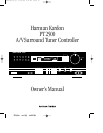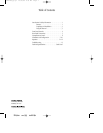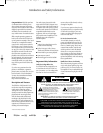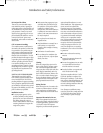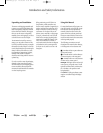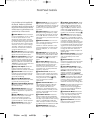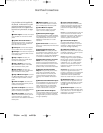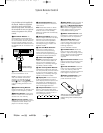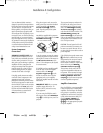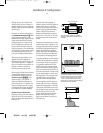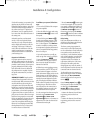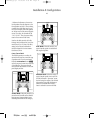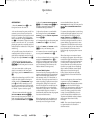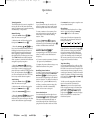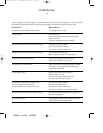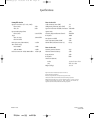
Introduction and Safety Information
Do Not Open The Cabinet
There are no user serviceable compo-
nents inside this product. Opening the
cabinet may present a shock hazard, and
any modification to the product will void
your guarantee. If water or any metal
object such as a paper clip, wire or a sta-
ple accidentally falls inside the unit, dis-
connect it from the AC power source
immediately, and consult an authorized
service center.
CATV or Antenna Grounding
If an outside antenna or cable system is
connected to this product, be certain that
it is grounded so as to provide some pro-
tection against voltage surges and static
charges. Section 810-B of the National
Electrical Code, ANSI/NFPA No. 70-1996,
provides information with respect to prop-
er grounding of the mast and supporting
structure, grounding of the lead-in wire
to an antenna discharge unit, size of
grounding conductors, location of anten-
na discharge unit, connection to ground-
ing electrodes and requirements of the
grounding electrode.
NOTE TO CATV SYSTEM INSTALLER:
This reminder is provided to call the
CATV (Cable TV) system installer’s atten-
tion to article 820-40 of the NEC that
provides guidelines for proper grounding
and, in particular, specifies that the cable
ground shall be connected to the ground-
ing system of the building, as close to the
point of cable entry as possible.
Installation Location
■
To assure proper operation, and to
avoid the potential for safety hazards,
place the unit on a firm and level sur-
face. When placing the unit on a
shelf, be certain that the shelf and any
mounting hardware can support the
weight of the product.
■
Make certain that proper space is pro-
vided both above and below the unit
for ventilation. If this product will be
installed in a cabinet or other
enclosed area, make certain that there
is sufficient air movement within the
cabinet. Under some circumstances a
fan may be required.
■
Do not place the unit directly on a
carpeted surface.
■
Avoid installation in extremely hot or
cold locations, or an area that is
exposed to direct sunlight or heating
equipment.
■
Avoid moist or humid locations.
■
Do not obstruct the ventilation slots
on the top of the unit, or place objects
directly over them.
Cleaning
When the unit gets dirty, wipe it with a
clean, soft dry cloth. If necessary, wipe it
with a soft cloth dampened with mild
soapy water, then a fresh cloth with clean
water. Wipe dry immediately with a dry
cloth. NEVER use benzene, thinner, alco-
hol or any other volatile cleaning agent.
Do not use abrasive cleaners, as they may
damage the finish of metal parts. Avoid
spraying insecticide near the unit.
Moving The Unit
Before moving the unit, be certain to dis-
connect any interconnection cords with
other components, and make certain
that you disconnect the unit from the AC
outlet.
Important information for the user
Note: This equipment has been tested
and found to comply within the limits for
a Class B digital device, pursuant to Part
15 of the FCC Rules. The limits are
designed to provide reasonable protection
against harmful interference in a resi-
dential installation. This equipment gen-
erates, uses and can radiate radio
frequency energy and, if not installed
and used in accordance with the instruc-
tions, may cause harmful interference to
radio communication. However, there is
no guarantee that harmful interference
will not occur in a particular installa-
tion. If this equipment does cause harm-
ful interference to radio or television
reception, which can be determined by
tuning the equipment off and on, the
user is encouraged to try to correct the
interference by one or more of the follow-
ing measures:
■
Reorient or relocate the receiving
antenna.
■
Increase the separation between the
equipment and receiver.
■
Connect the equipment into an outlet
on a circuit different from that to
which the receiver is connected.
■
Consult the dealer or an experienced
radio/TV technician for help.
This device complies with Part 15 of the
FCC Rules. Operation is subject to the
following two conditions: (1) this device
may not cause harmful interference, and
(2) this device must accept interference
received, including interference that may
cause undesired operation.
Note: Changes or modifications may
cause this unit to fail to comply with Part
15 of the FCC Rules and may void the
user’s authority to operate the equip-
ment.
2
PT2500 rev (G) 10/23/96
•PT2500(g).qx 10/23/96 7:36 AM Page 3



